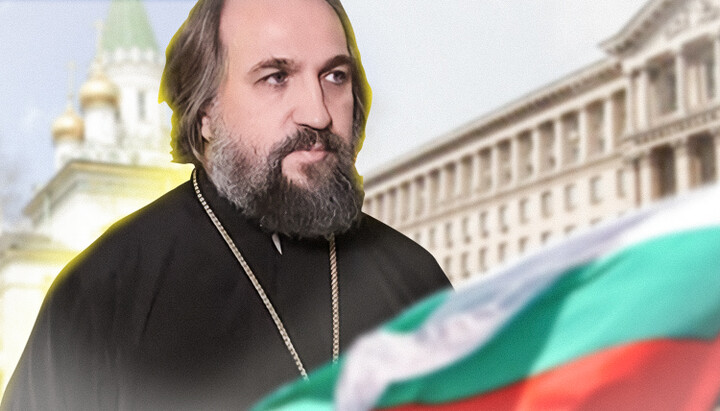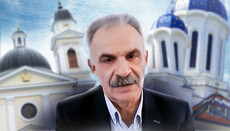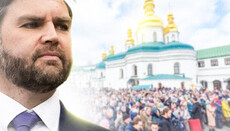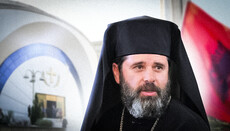Why are the ROC priests actually expelled from Bulgaria?

The Bulgarian authorities expelled the ROC rector in Sofia from the country, accusing him of espionage. Is Fr Vassian a spy or are there other reasons for his expulsion?
The situation surrounding the St. Nicholas Church in Bulgaria and the expulsion of ROC priests from the country has the potential not only to strain relations between the Russian Orthodox Church and the Bulgarian Patriarchate but could also influence the so-called "Ukrainian issue," particularly the recognition of the Orthodox Church of Ukraine (OCU) by the Bulgarian Church. Let's delve into why we believe this is the case.
Espionage or OCU Promotion?
On September 12, the authorities of North Macedonia barred the entry of Archimandrite Vassian (Zmeyev), the head of the ROC's metochion in Bulgaria, into their country. This decision was made following information received from competent authorities, suggesting actions by Russians that violated the Vienna Convention on Diplomatic Relations.
A few days later, on September 21, 2023, Bulgarian authorities decided to expel Archimandrite Vassian and two other representatives of the ROC, citing them as a "threat to Bulgaria's national security."
The Russian Ministry of Foreign Affairs called this incident an "outrageous unfriendly act by the Bulgarian authorities" and asserted that Bulgaria's aim was to "rupture relations between the sisterly Russian and Bulgarian Orthodox Churches."
In response, Bulgarian Prime Minister Nikolai Denkov explained the incident by stating that the decision to expel ROC priests from Bulgaria was based on a classified report. So, what is the "guilt" of Archimandrite Vassian?
It turns out that excerpts from a book by Olga Reshetnikova on the history of the Russian church in Sofia were published on the St. Nicholas Church's website. At first glance, this might not seem problematic. However, Olga Reshetnikova is the wife of retired Russian General Leonid Reshetnikov, who was the head of the Institute for Strategic Studies under the Russian President's administration for a period. General Reshetnikov gained notoriety in Bulgaria when in 2016, he accurately predicted the name of Bulgaria's future president – Radev – in an interview on the "Slavi's Show."
In 2019, EU Political Report linked Reshetnikov to Bulgarian opposition figure Nikolay Malinov, leader of the National Movement "Russophiles," which advocates for improved relations between Moscow and Sofia. Malinov was accused of espionage, and Reshetnikov was banned from entering Bulgaria. Now, a similar fate has befallen Archimandrite Vassian for publishing chapters from Reshetnikova's book on his website. However, mere publications on a website are unlikely to warrant expulsion from a country. Clearly, there are deeper reasons for Zmeyev's expulsion. What could they be?
In our opinion, this may be related to efforts on recognition of the OCU by the Bulgarian and Macedonian Orthodox Churches.
Non-recognition of the OCU as an Argument for Persecution
The head of the Macedonian Orthodox Church, Archbishop Stefan, has repeatedly stated that after receiving autocephaly from the Serbian Orthodox Church, Macedonians also need a Tomos from the Ecumenical Patriarchate in Constantinople. However, the Ecumenical Patriarchate has not rushed to grant this coveted document, possibly implying that it needs to be "earned." One way to potentially earn recognition could be through the recognition of the Orthodox Church of Ukraine (OCU).
In April 2023, the Macedonian Church announced its refusal to concelebrate with the OCU.
It was around this time that publications in Macedonian ecclesiastical and near-ecclesiastical press started suggesting that this decision was made by the Synod of Skopje with the involvement of Archimandrite Vassian (Zmeyev), the head of the ROC's metochion in Sofia, Bulgaria.
Zmeyev was appointed as the head of the metochion in 2018 following a church-diplomatic scandal involving the President of Bulgaria, Radev, and Patriarch Kirill of the ROC. Radev stated that Bulgaria was liberated from Ottoman rule not only by Russian forces but also by representatives of many other nations.
Patriarch Kirill corrected the Bulgarian president, emphasizing that precisely Russia was the liberator of Bulgaria, not Poland, Lithuania, or other countries. He declared support for historical truth and rejected any attempt to distort or silence it for political or pragmatic reasons. These statements caused outrage in Bulgarian political circles, who viewed the ROC as an ideological adversary.
As of today, there is no concrete evidence of Archimandrite Vassian's involvement in espionage. All accusations are based on assumptions and "coincidences."
For instance, Macedonian media reported that in May 2023, just two days after Archbishop Stefan sent a letter to the head of the Ecumenical Patriarchate requesting a Tomos for the Macedonian Church, Archimandrite Vassian (Zmeyev) arrived in Skopje without prior notice for a meeting. Journalists recalled that Zmeyev not only oversaw the visit of ROC Metropolitan Anthony to Sofia in 2022, immediately after the start of the war in Ukraine but also arranged for the latter's visit to Skopje, following which the Macedonian Church announced its refusal to concelebrate with the OCU.
As evidence of Zmeyev's "influence" on certain Macedonian synodal decisions, they cited his concelebration with two influential hierarchs in the country: Metropolitan Grigory of Kumanovo and Osogovo and the senior Metropolitan Peter of Prespa and Pelagonia.
You may wonder what's unusual about priests and bishops from different Orthodox Churches concelebrating. However, in Macedonia, it seems to be viewed differently.
It turns out that Metropolitan Grigory of Kumanovo and Osogovo is considered an "agent of influence of the ROC" because he was spotted attending a service in Jasenovac, Croatia, where he was in the "company of representatives of the Russian state and Church."
Interestingly, before this, the President of North Macedonia, Stevo Pendarovski, had mentioned receiving a warning from NATO leadership about Macedonian bishops who were "playing a role" in relations between Russia and Macedonia.
Apart from these bishops, Macedonian media reported that "two or three figures from the ROC, based in the Balkans," significantly influenced relations between the Churches. While the identities of these "figures" remain unclear, one name is known for certain—Archimandrite Vassian (Zmeyev).
Of course, it is not appropriate to accuse someone of espionage based on their acquaintance with Reshetnikov, let alone for hosting Russia's Ambassador to Bulgaria, Eleonora Mitrofanova, at the St. Nicholas Church. However, exercising "influence" over hierarchs in Macedonia and Bulgaria regarding the non-canonical recognition of the OCU could be considered a serious accusation in today's context.
Does Bulgaria Recognize the OCU?
The OCU is seen as a creation of the U.S. State Department, and it is natural that the recognition of this structure falls within the sphere of interests of American geopoliticians. We have repeatedly written about the pressure exerted by representatives of U.S. intelligence agencies on hierarchs of other Autocephalous Churches regarding the recognition of the OCU. Therefore, the situation with Zmeyev is just another piece of evidence in this regard.
On the other hand, today, non-recognition of the OCU is already sufficient grounds for legal action or persecution against an individual. Examples of this include Ukrainian bishops who are being prosecuted for refusing to call black white. Hence, the story with Zmeyev is not surprising.
What's interesting, however, is how far this will go.
The situation between the Bulgarian and Russian Orthodox Churches is continuing to escalate. After the expulsion of ROC priests from Sofia, the Russian embassy announced the closure of the St. Nicholas Church. However, immediately after this, Bulgarian Patriarch Neofit personally appointed Bulgarian priests to this church, essentially asserting that he owns the church.
In confirmation of this position, Metropolitan Naum of Rusenski from the Bulgarian Patriarchate stated that the St. Nicholas Church in Sofia is the property of the Bulgarian Orthodox Church. As evidence of this, Metropolitan Naum mentioned that the church was built with the blessing of the Patriarch of Bulgaria in 1914 (which is not very strong evidence). He also wrote that "in recent years, Bulgarian priests have been removed from the St. Nicholas Church without justifiable reasons," which he finds absurd.
Naturally, the ROC will not turn a blind eye to the appointment of priests and the "takeover" of the St. Nicholas Church. This is primarily because such actions by the Bulgarian Patriarchate clearly indicate "unfriendliness" towards the ROC. Recall that something similar happened in Moscow when the ROC effectively took control of the St. Nicholas Church in Kulishki from the Patriarchate of Alexandria, which recognized the OCU.
And is it a coincidence that on the same day when Patriarch Neofit appointed priests to the parish of the ROC in Sofia, an official delegation from the Patriarchate of Alexandria visited him?
Remarkably, in addition to Metropolitan Emmanuel of Ptolemaidos, who led the delegation, Archimandrite Vartholomaios, the abbot of the Athonite Monastery of New Esphigmenou, and Archimandrite Apostol were part of the delegation. Both Athonite monks are ardent supporters of Patriarch Bartholomew and proponents of his ideas, primarily the recognition of the OCU.
We presume that the goal of the visit of the delegation from the Patriarchate of Alexandria is precisely to persuade Patriarch Neofit of the necessity to recognize the OCU, as has already been suggested to him by Metropolitan Emmanuel of Chalcedon from the Patriarchate of Constantinople.
All of the above indicates that the Ecumenical Patriarchate (Constantinople) continues persistently and systematically moving towards its goal of compelling Autocephalous Churches to recognize the OCU.
Will it succeed?









